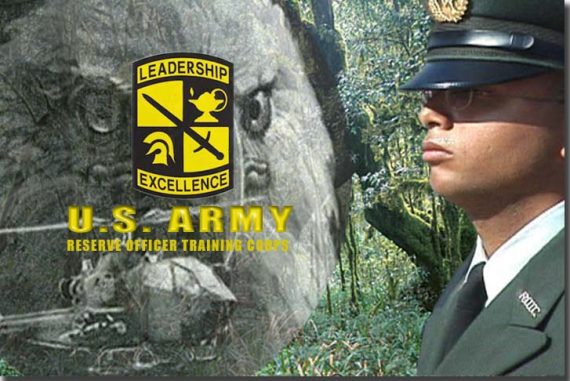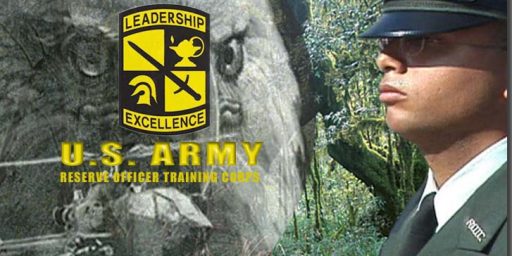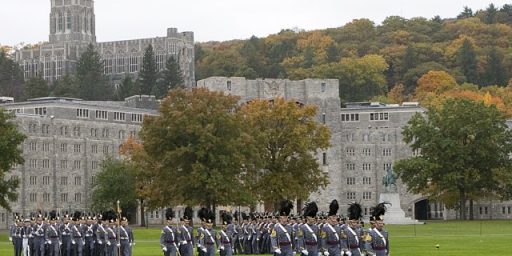ROTC Returning to Ivies
The repeal of DADT may open the doors for ROTC to return to many elite institutions, if cost doesn't get in the way.
Friday’s repeal of the “Don’t Ask, Don’t Tell” policy will end another controversy, as many of the nation’s elite universities have lost their excuse for not hosting ROTC programs.
Bill Kristol, that stalwart of conservative principle, wants the government to force schools to bring it back.
[O]ver the next two years Congress can do something else. It can take an interest in ensuring that discrimination against ROTC on college campuses ends.
Though ROTC was kicked off campuses like Harvard, Yale and Columbia before gays in the military was ever an issue, DADT became the excuse offered by those universities in recent years for continuing to discriminate against ROTC. The excuse is gone. One trusts the presidents and trustees of colleges that have been keeping ROTC at arm’s length, allegedly because of DADT, will move posthaste to ensure a hearty welcome and full equality for ROTC at their universities. One would expect that patriotic alumni of those universities would insist on quick action. One would hope that prominent individuals, like Yale alum Joe Lieberman, who played so crucial a role in ending DADT, would lose no time in writing president Richard Levin to urge the re-installing of ROTC at Yale, that Crimson alums like Chuck Schumer will be in touch with Harvard president Drew Faust, and that Columbia graduate Barack Obama will weigh in with Fair Columbia’s Lee Bollinger.
But the Republican House will also have a role here. It can make its views known to the leaders of universities that receive federal funds; it can enforce the existing Solomon Amendment; it may perhaps want to consider new legislation if universities remain obdurate.
But surely such legislation will be unnecessary. Surely the university presidents and faculty will move quickly. And surely young men and women seeking to join the military will very soon be welcome on all of our college campuses.
As it happens, yes.
The vote, said Columbia University President Lee Bollinger, provides “the opportunity for a new era in the relationship between universities and our military services.” “This is an historic development for a nation dedicated to fulfilling its core principle of equal rights. It also effectively ends what has been a vexing problem for higher education, including at Columbia — given our desire to be open to our military, but not wanting to violate our own core principle against discrimination on the basis of sexual orientation,” he said in a statement through a spokesman.
Harvard University President Drew Faust today signaled that she would move to restore ROTC to the campus. “Because of today’s action by the Senate, gay and lesbian Americans will now also have the right to pursue this honorable calling, and we as a nation will have the benefit of their service,” she said in a statement through a spokesman. “I look forward to pursuing discussions with military officials and others to achieve Harvard’s full and formal recognition of ROTC.”
A spokesman for Yale University also suggested that change may be coming soon. “We are aware of the vote and have plans in consideration,” said Yale spokesman Thomas Mattia in an email.
A Stanford official declined to comment for the record but noted that the school’s Faculty Senate is already reviewing the restoration of ROTC, a process that began last “in part in anticipation of the ‘Don’t ask Don’t tell’ issue,” and is due to consider a report and recommendation in the next few months.
My guess is that all or most of these schools will offer to bring back ROTC and that the military will then be in the awkward position of deciding that it doesn’t make sense to fund battalions at all of them.
As noted in our recent discussion on Geography and the American Military, officer recruiting is disproportionately concentrated in the South. Because of culturally and economically driven demand, the state of Alabama has 10 ROTC programs while New York City, with double the population, has only one. Chicago and Detroit have one apiece.
Indeed, the Army decided a few years back to close the ROTC battalion at the University of Pennsylvania — an Ivy — and merge it with the one at nearby Drexel.
Harvard students who have a desire to serve as officers can now train at MIT’s ROTC program. Will the demand be such that it makes sense to create a second program? As best I can gather, the two schools combine for a dozen or so Army second lieutenants and a similar number of Navy/Marine Corps commissionees. Given the geographical proximity of the schools, it may be hard to justify setting up a second full program.
One thing might help is to reach an accommodation on cost, where the schools waive tuition in excess of the limit of ROTC scholarships. It’s rather much to expect aspiring young officers to take on a sizable debt on a second lieutenant’s pay.







Since ROTC does not lead to a job in consulting, big law, investment banking, an IT start up, or being a policy wonk, I doubt if any Ivy leaguers will be interested.
Being in the military is a normally distributed career. A 2LT does not get paid more because he went to Harvard or Yale. However, an entry level consultant or investment banker does get paid more for being a Harvard man.
ROTC is concentrated at middle class universities because being in the military is a middle class occupation.
In the main true. But Harvard alone commissioned 5 Army officers, 5 Navy officers, and 2 Marines last year via MIT’s program. That’s not insignificant.
While most people, reasonably enough, choose careers based on highest monetary reward, there are those who choose to serve — at least to do their bit before going off into more lucrative fields. The history of graduates of elite universities doing a hitch as officers in the military, intelligence community, and foreign service is long and distinguished.
James – People like SD believe money is the only thing that matters. They will never understand that many people of privilege do want to serve and do something other than chasing the almighty dollar. While they are a minority, I think they should be acknowledged and not denigrated.
superdestroyer, I graduated from Princeton. There are all kinds of students at the Ivies.
DC:
Indeed, the number of sons of Senators and Representatives (including the son of the current Vice President) who’ve served in Iraq and Afghanistan, while small, actually compares favorably to the general population.
Clearly the Army is suffering from a lack of second lieutenants who know the words to the Whiffenpoof song.
I went to a pretty well-to-do public high school and when I look back at the people that planned to join the military, I am pretty impressed. I knew more people in honors classes than in the HS ROTC. They were people that had a number of options. I’m sure if I went to a lower-class high school I would probably have met a lot more who went with the military because it was the best of a number of less-than-stellar opportunities, but that doesn’t change the fact that a lot of people go into the military for other reasons.
I’m trying to put the possibility of a military career in my daughter’s head. Granted she’s only 11 but she’s very tough, aggressive, physical and fearless. Somehow I can picture her with sergeant’s stripes scaring the hell out of new recruits. Despite my being an elitist liberal terrorist-coddler and real-America-hating atheist that would make me proud.
At this point I wonder whether the Ivies need the ROTC more than the ROTC needs the Ivies.
Charles, you really are the “glass half empty” type. You get what you wanted, ROTC is back on the campuses, and you wonder if they should go back at all.
I got what I wanted? Really? Thanks Santa.
Tsk tsk…what is really at the top of Charles’s Christmas List is smaller government…sadly for him, Charles will only get a lump of coal in his stocking this year and for quite a few years in the future…
> I went to a pretty well-to-do public high school and when I look back at the people that planned to join the military I am pretty impressed.
I had the same experience. Probably the single most impressive guy I knew growing up went to the Air Force Academy. He could have gone to any college in the country, 4.0 GPA & a good enough football player that he probably could have gone pro. I believe that he is a general now. He was the most outstanding example, but not the only one by any means.